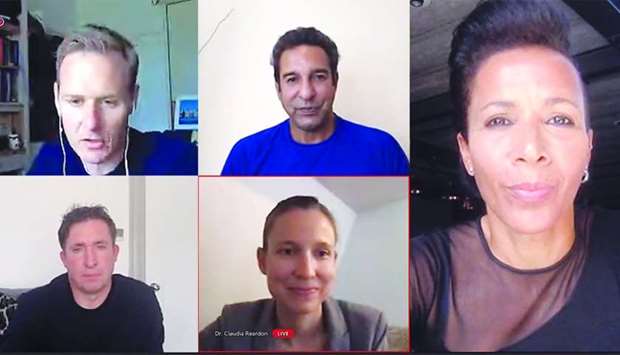Mental struggles have been major hurdles at several high level competitions, affecting their performances, noted some leading sports stars at a webinar organised by the World Innovation Summit for Health (WISH) on Wednesday.
WISH, a global health initiative of Qatar Foundation will hold its biennial summit virtually this year from November 15 to 19.
Olympic gold medal-winning athlete Dame Kelly Holmes, former Liverpool and England footballer Robbie Fowler, and Wasim Akram, former captain of Pakistan cricket team, shared their experiences at the webinar ‘Mental Health & Sport: The Challenge of Balancing Risk With Reward.’
The event also featured Prof Claudia Reardon, who specialises in sports psychiatry and co-chairs the International Olympic Committee’s working group on mental health. the session was moderated by BBC News presenter Dan Walker.
The sports stars revealed several occasions where they had to undergo severe mental pressure of being at the top of their sport and the personal turmoil they endured. The situations included injuries and illness as well as dealing with abuse and allegations. The WISH event highlighted how mental health issues can affect anyone, and the importance of seeking help when they arise.
Holmes recalled how she suffered a serious mental breakdown during her athletics career due to several injuries. “I looked in the mirror and hated everything about myself, including my body for letting me down,” she said. “That day, I became a self-harmer.
“I self-harmed once for every day I had been injured, and I hid it because I had never known of anyone in my network dealing with the problem I had. Half of me was dying, and half of me was living for my dream, because I had a World Championship to go to, and that kept me going. I won a silver medal, but nobody knew what was happening with me. I just had to stay focused on my dream and hope that would keep me going.”
Akram during his interaction revealed how he was accused of deliberately losing a World Cup final while captaining the team and had to face a rebellion from his teammates. He also highlighted how he was upset when he was diagnosed with diabetes at the age of 29.
“Now, there is a lot more awareness of mental health, but when I was in my mid-20s and became captain of a cricket-mad country, I was lost,” he noted.
“When my team said they would not play under me, that was a dark time. Imagine playing in a team and not speaking to anyone in it for a month and a half. The culture in Pakistan was that we are mentally very tough and we didn’t talk about mental health. It took me two years to come back from it,” he continued.
Fowler said, “To be a top sportsperson, you have to have tunnel vision about what you do and put everything else aside, and as I got older I maybe struggled with that – if I didn’t like what I was doing, I could never come out and say it, because I felt that lots of people would give anything to be where I was.”
Fowler also spoke about his own experience of how the spectre of serious injury haunts sportspeople and can affect their psychological health.
According to Prof Reardon, athletes speaking about their own mental health issues can “demystify and destigmatise” the subject. “There has been less stigma in recent years, but sport is still one of the final frontiers when it comes to mental health. It’s very hard to have a game-face on the field, then step off it and say something is wrong and reach out for help,” she added.


